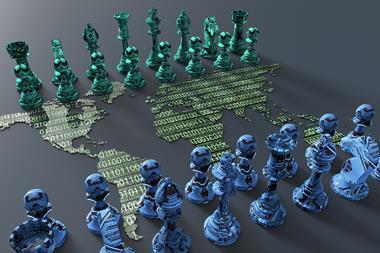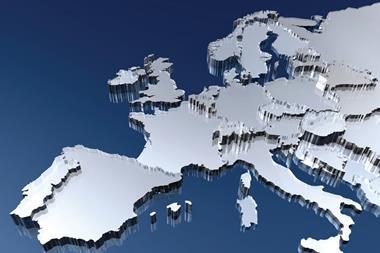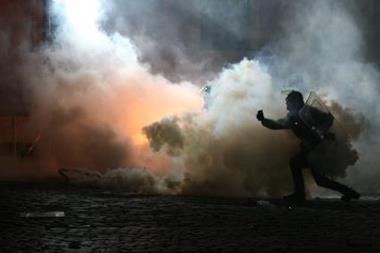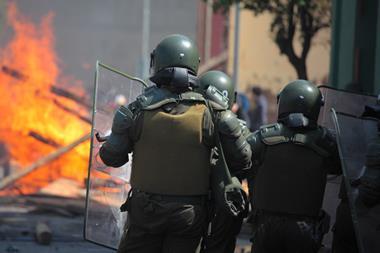In 2022, the world will start to spin differently thanks to a new global geopolitical order
This transition will take time, but will drive considerable disruption as countries, blocs and hemispheres begin to interact differently. The uncertainty to which we have uneasily adjusted in recent years will persist as we leave the geopolitical comfort zone – and we use that phrase cautiously – of decades past.
The US’s chaotic withdrawal from Afghanistan starkly symbolised its broader retreat into domestic concerns and pivot towards issues further east. This leaves the world, for now, without the dominant global power that has essentially set the terms and conditions for international commerce, security and geopolitics for the past 70 years.
Without the US fulcrum, a weak geopolitical order raises the risk of failed states, weak rule of international law and norms, and renewed tensions in regional flashpoints.
Meanwhile, we are lurching through an energy transition and process of digitalisation that promise to be both disruptive and disorderly.
The situation is fluid enough to become a major concern for companies – in our upcoming Global Risks Survey for 2022, just about every other company we asked said it was reevaluating its long-term strategy in response to changes in the geopolitical environment.
So, now what?
Business risks
For business, this grand repositioning means geopolitics will be impossible to ignore. Far from simply constituting a change of scenery – the backdrop to the business risks at centre stage – the shift in states’ power, influence and priorities is the drama.
Think of any major challenge policymakers and business leaders face in 2022 – securing energy supplies, ensuring supply chain resilience, achieving sustainability, providing values-based leadership, guaranteeing security, accelerating growth out of the pandemic. Geopolitics will shape all these opportunities and risks.
Geopolitics will also partly explain or feed inaction, inertia or outright failure on the part of states and multilateral organisations to address profoundly significant issues that fuel business risk.
For companies, this means both facing heightened and evolving risks and being left to pick up the pieces.
On no issue is this already more stark than climate change, as pressure grows inexorably on business to find solutions politicians have proved unwilling or incapable of addressing.
Mind the gap
Some Western politicians fear that China will exploit this apparent power vacuum to establish a new world order based on its strategic priorities and values. This would see the rest of the world forced to engage with China on Chinese terms regarding technology, data, intellectual property, capital flows and even global security, to name just a few. Businesses are perhaps more concerned about the impact on competition and regulation of this growing geopolitical rivalry.
China has been big enough to dictate terms for a long time. Although the US is pushing back with increased force, its diminished influence and credibility are undermining this renewed regulatory vigour. A world order dominated by a more powerful China would only intensify ongoing debate about how global companies can sustain growth in inconsonant jurisdictions, grapple with compliance when regulatory requirements across borders are contradictory or conflicting, and effectively invest in new markets that may jeopardise or be jeopardised by geopolitical wrangling.
China was once the world’s greatest driver – and beneficiary – of globalisation. It is now the focal point for global fears of “decoupling”.
Nonetheless, there are brakes on China’s emergence as the new global sheriff. The world’s sole major remaining “zero-COVID” country, China has yet to reopen fully for international business travel. Its economic climb out of the pandemic was swift and robust, but the recovery has since tapered amid financial stress and power shortages.
International perceptions of the US have rebounded somewhat under the Biden administration, while those of China have deteriorated as it has adopted an increasingly aggressive foreign policy. Moreover, China’s geopolitical influence is now challenged by a series of domestic regulatory matters that are taking some of the shine off China’s message of a few years ago that it is an economic and political beacon for the rest of the world.
Meanwhile, the US is not entirely withdrawing into its shell. In terms of hard and soft power, it remains a superpower, if a more reluctant one. The US’s global ambitions will be more “sustainable” – the political and economic costs of being a hyper-power are no longer affordable. The US public is less supportive of an interventionist foreign policy.
The US will continue to preserve and protect strategically important relationships, not least – and pointedly so – in Asia. It shares with all other states a fundamental need to protect and project strategic advantage and secure the roots of future growth and prosperity. These goals require the pursuit of goals abroad. Nonetheless, it will face renewed scepticism about its reliability as an ally and greater competition for status as a donor, investor, supplier and friend.
New Sources of power
We are in the early days of understanding what a world with a diminished global US presence looks and feels like. Nature abhors a vacuum. So does geopolitics. That said, we will not see a great rush in 2022 into the space the US is ceding, but rather the beginning of the repositioning.
In some ways, this new geopolitical order will be shaped by age-old issues relating to securing sources of power, resources and trading routes. But these sources are changing.
In particular, countries with resources key to “green economic growth” will see their status rise, while those with fossil fuels face a more uncertain future. The haves and have-nots are evolving.
As wood and whale oil gave way to fossil fuels as the key energy source driving geopolitical competition, now fossil fuels are beginning to cede the ground to renewable alternatives.
This will have profound implications for the relative status of particular states, trading routes, currencies and businesses.
No longer content to watch the geopolitical arrows fly overhead between Washington DC and Beijing, the EU will continue to seek to become an even stronger and more prominent international player as it furthers its commitment to “strategic autonomy”. But for the time being, its main source of global power will remain its vast regulatory might’, , particularly with regard to two of the world’s most powerful currencies: data and carbon.
The EU has a full suite of foreign, security and defence policies, but their effectiveness is open to debate. Distracted by internal political brushfires (Hungary, Poland) and the post-Merkel leadership transition, Europe will remain the normative power it is today.
Meanwhile, a reordering of the world will need to accommodate countries that will undergo further profound change to their global status and, in some cases, fragility, reflecting demographics, vulnerability to climate change, natural resources, strategic location and economic growth.
These states, think of Russia or India, for example, may not accept a world order determined by a handful of well-established global titans, be they from the West or the East.
Although their overall influence may be limited, they could export instability, undermine the potential for international cooperation on key geopolitical issues, and opportunistically obstruct access to resources.
As this realignment gets underway, and in the absence of global guarantors of order, expect attention to refocus on some long-familiar geopolitical flashpoints: Iran-US, Taiwan(China), Pakistan-India, Russia-Ukraine.
In a world where military power is more difficult to deploy, look for signs the non-military arms of geopolitics – sanctions, cyber-attacks, regulatory blitzes – are growing more aggressive.
Know your geopolitics
In 2022, geopolitical risk will need to be understood, managed and monitored more actively than for generations. It will play out in the digital world, in the way investments are scrutinised or prioritised, in how sanctions regimes evolve, in global engagement with multilateral and international initiatives and organisations, and in the distribution and recognition of COVID-19 vaccines and treatments.
Geopolitical flashpoints warrant constant monitoring if relevant to a company footprint and exposure. Regulatory changes and sanctions too can be direct and disruptive products of geopolitical conflict.
But beware, dramatic moves by states can be deceptively or misleadingly characterised by rivals and reported inaccurately in the news. Enter the role of accurate intelligence, local knowledge and long-term monitoring, which enables business to contextualise, assess and treat risks to their operations and assets.
Business can, and must, go beyond tolerating geopolitical risk to actively managing it. To do so, they can draw on established and effective political risk management tools such as scenario-forecasting, identifying drivers, triggers and issues to track, and risk monitoring to identify trends with respect to specific flashpoints, sanctions, regulations or relationships, including US-China.
This will enable them to understand the implications of developments for their people, operations and brand. Companies must ensure they have a good understanding of the implications of those developments which are dramatic, but in addition – and perhaps more significantly - they need to be identifying and analysing the developments which are subtle, but tectonic.
Charles Hecker is a partner and Claudine Fry is a director at Control Risks




















No comments yet